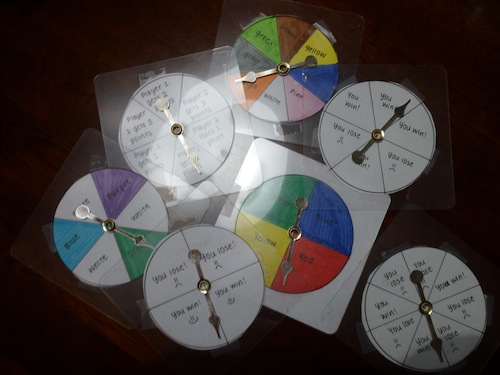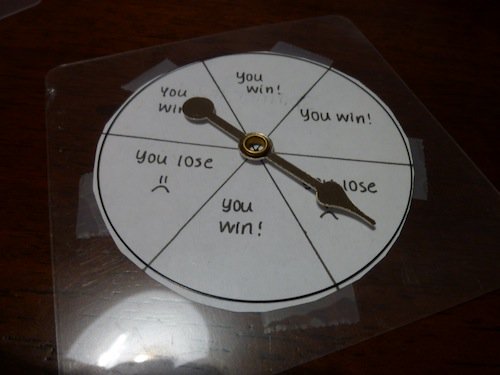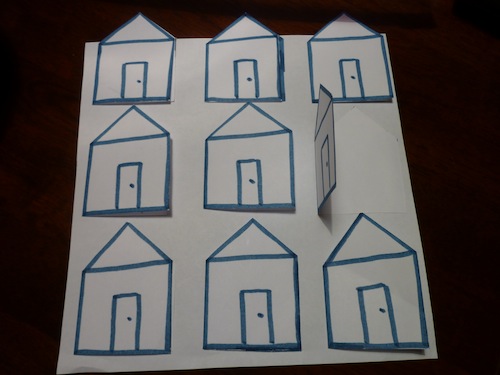On Teaching and Learning by Anna H. '14
Minimum requirement: read the last few sentences of this post. They're important.
When you last heard from me, I had just arrived at The Middle Of Nowhere, New Mexico – out on a Navajo Reservation.

To recap, I’m here for MIT’s Four Weeks For America Challenge, which sends about a dozen students to schools around the country during IAP, to try and make a difference in communities that need it the most. Each of us is paired up with a Teach For America teacher; my host teaches Algebra I, Algebra II, and Pre-Calculus. The high school is 100% Navajo, and about a quarter of its students go on to graduate. Even fewer go on to college.

I’ve been out here for two and a half weeks now. I’ve seen seniors in Algebra II who don’t know the difference between subtraction and division, and students of all grade levels who can’t write a grammatically correct complete sentence.
I’ve learned that teaching is hard. Really hard. I have come to believe that teaching is an art form: preparation followed by performance, with the energy and creativity to improvise if – when – something doesn’t go according to plan. When you teach, you find yourself frantically coming up with a zillion ways to explain the same concept; one person might just need to see an example, but another might need to see it graphically, or visually with coins and blocks. You also get to have a lot of fun making said visual aids.



Teaching is a subtle art. Human beings are sensitive. Make a face when a student gives a wrong answer, and he or she may shy away from participating for the rest of the semester. Fail to acknowledge improvement, and a student may stop daring to improve. Most dangerous of all, fail to make it absolutely clear that you believe in every single individual’s ability to succeed – and students are unable to believe in themselves.
A few days ago, I found myself sitting with a sophomore who was learning the Pythagorean Theorem. Unfortunately, learning the Pythagorean Theorem is difficult when you have no idea how to square, or take the square root of, a number. Explaining it in words was like head-butting a brick wall, so I realized that it was time to change tactics.

I jumped up, and ran to the cupboard. Flinging the doors open, I grabbed a bag of blue coins, and knelt down next to the student. “Okay,” I said. “Let’s try this a different way.” I pulled out three coins. “How many is this?”
“Three.”
“Right. Now, we’re going to turn these three coins into a square!” I pulled out six more coins, and arranged them in a 3×3 grid. The student looked at the coins in alarm. I continued my little improv act: pulling methods of explanation out of the air. “Squaring a number literally means…turning it into a square! Creating a square with that number on each side.”
A hesitant nod. A nod! I was so excited. “So, what is three squared?”
Silence. Come on, come on, come on.
“Nine.”
YES!
“Yes! Nine! GREAT! See? You get it. Now, figure out four squared. You can use the coins.”
He stared at me. I grabbed the bag, and dumped out about thirty coins onto his desk. He tentatively scooped some out of the pile, and sat forward in his seat. Soon, an elegant little 4×4 grid lay before him. He even shifted the coins at the edges to make them line up perfectly.
“Sixteen.”
“Exactly.” Success!
Moments like that are what keep me going.
That story had a happy ending, but carries with it a tragic undertone. The sophomore I taught to square numbers is one of a hundred kids in this high school – a hundred kids who have gone through their entire academic careers without a solid foundation in basic number manipulation. Take a look at these two examples.
Heart-breaking Example 1
Me: “So, you flip a coin. What’s the probability of landing on heads?”
Freshman: “I don’t know.”
Me: “Okay, so remember our formula for probability…”
Freshman: “Oh! Oh! Two over one.”
Me: “Two over one? But that’s a fraction bigger than one! That doesn’t make any sense.”
Freshman: *blank stare*
Heart-breaking Example 2
*solving an equation for x*
Me: “So, is x by itself now?”
Senior: “No.”
Me: “So what do we have to do?”
Senior: “Divide by negative one.”
Me: “Yes! Exactly.”
Senior: “I don’t know how to do this part.”
Me: “Well, what’s negative x divided by negative one?”
Senior: “x?”
Me: “Yeah! And what’s four divided by negative one?”
Senior: “Five?”
Me: “DIVIDED by.”
Senior: “Um…three?”
Me: “Don’t just guess. Think about it.”
Senior: “One? Negative one? Four?”
–
I don’t know what conclusion you drew from those two dialogues, but I have been realizing, with increasing horror, that many of these kids don’t understand numbers. They learn the operations by rote memorization: they have no idea what a fraction means, what probability means, or what it means to divide or subtract or multiply or square. Because of that, they get the operations mixed up, and keep guessing as you prompt them.
In the students’ junior year, they take an exam called the NMSBA: the New Mexico Standards-Based Assessment. If they pass, they can graduate. If they fail, they cannot graduate, and therefore cannot go onto college. The exam covers math through Algebra II, and it’s obviously important that they learn as much of the material as possible. Imagine that you are an Algebra II teacher. What do you do with a classroom of juniors who never really learned the difference between division and subtraction? Take the time to give them a conceptual understanding of basic math, and you have no time to teach them what they need to know for the NMSBA. Don’t take the time to do it, and they struggle to learn new material, and lack the tools to problem-solve. Combine that with opportunities lost to snow days, professional development days, national holidays, the days that students simply skip – and you face a daunting challenge.
–
I’m not here specifically to be a teacher; I’m here to help out in the classrooms, and work on some sustainable projects of my own. One afternoon, however, my host teacher had to proctor an exam, and her Pre-Calculus class of seniors were supposed to spend the day in the gym. In our opinion, this was a waste of precious learning time, so I stepped in for the class period and taught them exponential decay and half-lives. After class, a few of them stayed to chat. It was a strange feeling; this time last year, I was in their shoes: a senior in high school. A couple of them are nineteen already. I turned eighteen a few months ago. I don’t think of myself as their teacher; I think of myself as someone their age, who has as much to learn from them as they do from me.
Case in point: fifteen minutes after class, one of the Pre-Calc kids was at the board, while I sat in a chair and struggled to understand the intricacies of Navajo family relations. It turns out that in Navajo culture, it is possible for an eighteen-year-old to be his nineteen-year-old friend’s grandfather. Apparently, who your relatives are is not determined strictly by blood or by who gives birth to who, but by your clan names. If you don’t find this interesting, feel free to skip over the next section, but I thought I’d do a quick lesson for those of you who are intrigued by what is in my opinion a highly bizarre phenomenon.
—
A QUICK LESSON IN NAVAJO FAMILY RELATIONS (as Anna understood it. Take with several very large grains of salt.)
You meet Man A and Woman B. Each of them will introduce themselves to you by name, and then by their first four clans; in English, this would sound like “I am (Man A’s Name). (Clan Name 1), (Clan Name 2), (Clan Name 3), (Clan Name 4).”
Man A and Woman B get married and have children. The children’s four clans are taken from their parents’ four clans, in the following order:
Man A: Clan 1A, Clan 2A, Clan 3A, Clan 4A
Woman B: Clan 1B, Clan 2B, Clan 3B, Clan 4B
Children: Clan 1B, Clan 1A, Clan 2B, Clan 2A
Your first clan is your mom’s first clan, your second clan is your dad’s first clan, your third clan is your mom’s second clan, and your fourth clan is your dad’s second clan.
Weird situations like being your friend’s grandfather arise because there aren’t that many clan names around here. Imagine that you and your friend exchange clan names:
You: Clan A, Clan B, Clan C, Clan D
Your Friend: Clan E, Clan F, Clan A, Clan H
In this situation, you would be your friend’s maternal grandpa, because your first clan is his third clan.
…I think?
Ponder that for a while.
—
My life out here has comprised of coexisting as teacher and student.
On the teacher side of things: I go to bed at 10:30 and get up at 6:30. I improvise, constantly trying to find newer and simpler ways of explaining concepts. My before-school, lunch, and after-school time is the kids’ time to ask me for help. I put so much of myself into tutoring and mentoring that when one of my kids (they’ve become “my kids”, even after two and a half weeks) doesn’t do well on a test, my heart sinks as though it were me getting that grade. When one of them gets an A, or shows significant improvement, I celebrate like it were my own. Chatter and giggling during class drives me crazy, when eight months ago it was my highly-entertaining friends and classmates doing the chattering and giggling.
On the learner side of things: I learn that every minute of class time is precious learning time that cannot be wasted. I learn that what is a simple explanation for one person might be the most complicated thing in the world for another. I learn that out on the reservations, kids are growing up without electricity or running water, with – in some cases – an alcoholic parent, and no role models. I met a boy who butchered an animal for the first time when he was four and has an interview with Princeton on Saturday, and a girl whose mom was murdered last summer. I learn how to be patient, how to never give up, how to frame and reframe questions, and about how I need to be less of a control freak, and instead need to push students to solve problems on their own. I learn about a beautiful culture that’s isolated from the rest of the world, and wonder what will happen to it if its children succeed in high school, and depart for universities around the country and around the world.
I’d like to finish by asking you to do me a favor. Think about your favorite teachers. The ones who took the time to tutor you during lunch, or after school…the ones who inspire you, the ones who will always believe in you…and take a minute to think about how much effort and energy they throw into teaching – how much effort and energy they give for you – every day. Think about it, appreciate that you’re lucky enough to have mentors like that, since not everyone gets that chance – and thank them.
That was a truly touching post! I intended to read only the last few lines but ended up reading the whole article. You probably motivated a bunch of readers to choose teaching as their career. Speaking of which, teachers are really underpaid in many parts of the world. I hope that some day this lamentable phenomenon will change and those Navajo kids will not go through more than nine years of education without even getting a proper grasp of basic math operations.
Great Post!!
And I cant help saying: “FIRST!!!!”
Beautifully written. I tutor at my high school and it was only when I first started tutoring that I started appreciating how difficult it really is for teachers. Teachers do some of the most important and most difficult work in the world and don’t get nearly enough recognition for it, either.
I’ve had a similar experience in that there’s an extended Somalian family that goes to my school, and most of them have never had formal education before they moved here. Several of them stay after a few times per week to be tutored in math, and so I’ve had experience with them. It’s so sad to see how several of them don’t even know how to add without a calculator, or what have you, just because they’ve never had a good teacher. You’re doing such an important job; I admire you a lot for it.
There are many kids, not on reservations, just in our regular school system, who also suffer the same maltreatment in terms of the education they receive. I don’t know what the education in London was like– maybe better, maybe not. But it’s lamentable that any sort of real education reform tends to get caught up in red tape. The problems you brought up are spread across the nation.
But I’m glad you understand what a lot of bureaucrats seem not to: teaching is hard, which is why you can’t always gauge teaching by student performance. And while you seem to have had mostly kids who were willing and even eager to learn, teaching is even harder when the student is unwilling.
This is an interesting post.
I can empathize. I had a science exhibition where I was presenting a model on the optimization of the aviation industry using mathematical modelling. But then out of the 5,000 odd (or even) students who turned up for the expo, only a handful knew what I was going on about. Most had never seen an aircraft. I then had to change my plan and teach them the basics of flight using a flight simulator. Even though I had barely a few minutes with each batch, that smile of understanding on their faces was worth the effort of talking non-stop for 8 hours with no lunch break.
@Khurram Manzoor & Ryan: Thanks!
@Anonymous & Vivek: It’s great to hear about your experiences! It sounds like you’re doing great work.
@Lavender Country: I hope so too, and I know that there are people across the country working tirelessly to make that happen.
@anonymous: Thanks for bringing that up! I definitely don’t want to leave the impression that this problem is something limited to the Navajo Nation; I just don’t feel qualified to talk about the issue elsewhere, since this is the only place with which I’ve had first-hand experience. London is like any big city in the US: there are good schools and good teachers, and there are bad schools and bad teachers. I think that every kid wants to learn (or at least, that’s what I tell myself) – but they often stop trying because they don’t believe in themselves, or they don’t see the relevance of certain subject matter towards their futures. This is one of a teacher’s biggest challenges, in my opinion: getting the kids invested in their learning.
Thanks for a beautiful story! Teaching IS very hard, but so rewarding when you see the light bulb come on!
GREAT BLOG !!
I don’t read or comment much here, but I just thought this was a beautiful, gentle post and I’m proud that you’re taking on this challenge during IAP! It also sounds like you’re a very intuitive teacher, that’s wonderful.
Have you taught for ESP?
How did the seniors make it to Algebra II without knowing the difference between subtraction and division in the first place?
Anna, kudos to you for a brilliant, beautiful and oh so touching post! It helped me to understand the emotions my teachers experience. I can now make some sense of their hopes, expectations, disappointments, challenges, frustrations and joys. Loved the post!
Great blog. thank you. i love it. my child like to give her teachers little thank you notes now and again especially if she missed a lot of homework. Is it a form of bribe? Who knows. But on a different note, she volunteers at the middle school once a week tutoring the kids that needed help and majority of the time, the younger kids will ask her opinion/advice on stuff other than math/reading/writing. Stuff about being bullied or figthing and so on. I guess sometimes it is easier for kids to communicate with their peers instead of the adults. Keep up your volunteering/role models. We need more kids like you around.
But on a different note, she volunteers at the middle school once a week tutoring the kids that needed help and majority of the time, the younger kids will ask her opinion/advice on stuff other than math/reading/writing. Stuff about being bullied or figthing and so on. I guess sometimes it is easier for kids to communicate with their peers instead of the adults. Keep up your volunteering/role models. We need more kids like you around.
I am a teaching intern at my high school, which is a selective school, yet even there teaching is very difficult. I cannot imagine the difficulties you have faced, yet at the same time I do understand that feeling when you have success and the students start to get it. I applied to MIT early and was deferred and the Four Weeks For America Challenge has just shown me another reason to want to go to MIT. I already tutor and occasionally teach lessons at my high school but i think it would great to do it somewhere where it makes a large difference (What I do helps at my high school but our graduation rate is almost 100% anyway), and I think this program would be an excellent opportunity.
Four Weeks For America Challenge– Challenge Accepted.
I’ll be honest. The thing that shocked me the most about your post was the square thing. Up until now, I had no idea that’s what squaring a number meant.